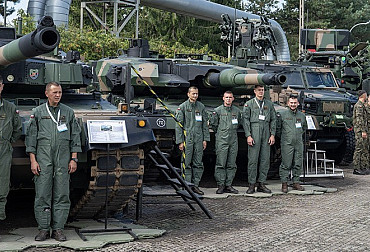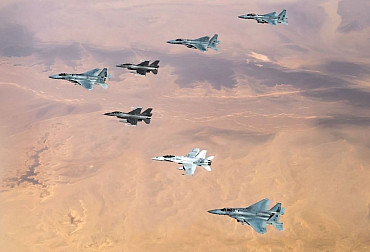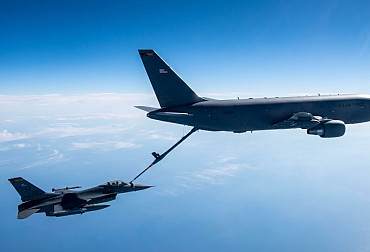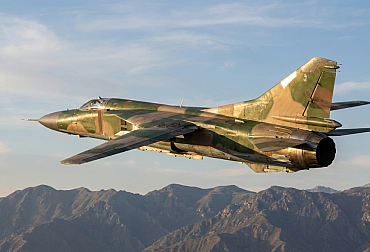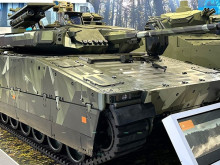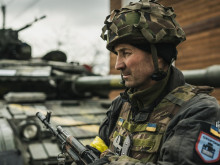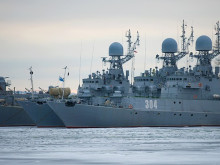CV90: Armoured backbone of the Czech defence industry
The order for CV90 infantry fighting vehicles worth more than CZK 50 billion is not just a modernization of the Czech Army's equipment. It is also a catalyst for a profound transformation of the Czech defense industry. Dozens of companies are involved in the project, ranging from the state-owned giant VOP CZ to leaders in optics, electronics, cabling, and simulation, as well as medium-sized and family-owned manufacturing companies in the regions. In just one year, the Czech Republic has become an integral part of the European supply chain and gained access to export contracts, know-how, and long-term stability. How do the companies themselves assess this transformative year? And what challenges and opportunities await them between now and 2030?
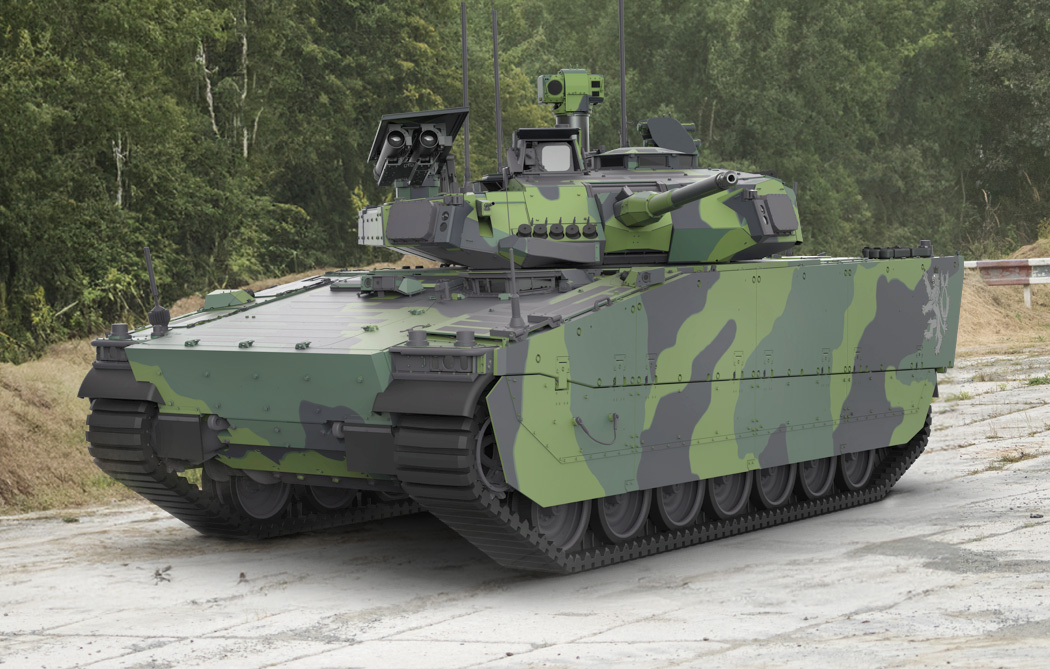
The strategic value of the CV90 program for the Czech Republic
When the Czech Republic signed a contract with BAE Systems Hägglunds in May 2023 for the delivery of 246 CV90 MkIV infantry fighting vehicles, it was, without exaggeration, one of the most important defense contracts since the country became independent. With a total value exceeding CZK 50 billion, this was not just a modernization of the Czech Army's equipment, but a systemic step towards strengthening the country's defense capabilities, technological self-sufficiency, and industrial competitiveness.
From the very beginning, the contract envisaged robust involvement of the Czech defense industry – according to official data, at least 40% of the contract value is to be realized in the form of industrial cooperation in the Czech Republic. This share includes not only final assembly or component deliveries, but also development, system integration, training and simulation systems, and technology transfer to Czech companies. Such broad cooperation demonstrates that the Czech Republic no longer seeks merely to be a customer, but aspires to the status of a competent and respected partner.
"BAE Systems remains fully committed to fulfilling its industrial cooperation obligations under the agreement, and the current production model for the CV90 MkIV program will ensure that this commitment is met," said Håkan Karlsson, Manager for Industrial Cooperation and Partnerships.
It is precisely the clear commitment of the main supplier – accompanied by transparent communication, technical dialogue, and predictable management of project steps – that enables Czech companies to gradually take over responsibility for entire production segments. The approach of the Ministry of Defense is also significant, as it insisted during the contract negotiations that the cooperation of Czech companies should not be merely formal, but truly beneficial in terms of their expertise, employment, and long-term stability.
Today, two years after the contract was signed, it is clear that the strategic decisions that framed the contract are proving to be the right ones. The Czech defense industry is entering a new phase of development – not only as a supplier to the domestic army, but as part of the European defense production system. And it is the CV90 program that is becoming an important pillar of this transformation.
Opportunities for Czech industry in numbers
Even before the final assembly of CV90 vehicles begins in the Czech Republic, it is clear that the project is already having a noticeable impact on domestic industry. What's more, Czech companies are already involved not only in supplying the Czech Army, but also in manufacturing components for international CV90 programs, including versions for Sweden, Ukraine, Denmark, and Slovakia, as well as for other BAE Systems platforms, such as the BvS10 tracked vehicle.
The scope of cooperation covers a wide range of activities – from cabin assembly, optoelectronics, cable harnesses and simulators to advanced command and control systems. The state-owned company VOP CZ remains a key player, responsible not only for project management, chassis integration, and vehicle variant development, but also receiving orders for driver cabins for foreign projects. In addition, preparations are underway for series production of chassis, which is scheduled to begin in 2026.
For example, Excalibur Army is responsible for the production of turrets. In addition to working on turret systems, it is also involved in the supply of components such as transport boxes and structures for anti-tank guided missiles. Meanwhile, Meopta is involved in the production of the state-of-the-art UTAAS optical system in cooperation with the Swedish company Saab. Production is already underway, with contracts securing orders until 2030 – not only for the Czech Republic, but also for Slovakia and other CV90 users.
The Brno-based company VR Group plays an important role in the development of advanced simulation platforms. Work on the first mobile platform is already underway. Ray Service will play a key role in the production of cable harnesses, and negotiations are currently underway to determine the exact scope of its deliveries.
Other important orders have also been placed with EVPÚ Defence, which supplies command sights, laser warning sensors, and remote-controlled weapon stations. Some products are already in series production, while others are undergoing fine-tuning at BAE Systems laboratories. A significant volume of subcontracts has also been awarded to ZAKO Turčín, which provides high-precision machining and welding of key armored steel components. The company is also one of the suppliers of painted assemblies and assembly units.
Major build-to-print suppliers – Laser Centrum, Jihotech, Chropyňská strojírna, and VMV – manufacture subassemblies, bent parts, protective elements, and structural units according to BAE Systems documentation. Production is currently running at a low rate (low rate initial production), with an increase planned for 2026.
Technology transfer and skills development: More than just manufacturing
One of the greatest benefits of the CV90 program for the Czech Republic is not only the amount of money flowing into domestic industry, but above all what these contracts bring with them: technology transfer, a shift in skills, and the expansion of Czech companies' capabilities in key areas. In other words, we are not only manufacturing, but also learning. And we are doing so in a way that has been rather exceptional in the Czech defense sector to date.
The state-owned company VOP CZ plays a key role in development, integration, and assembly. As its director Vlastimil Navrátil states, “Thanks to this cooperation, VOP CZ will once again move forward and gain valuable know-how that it can use in the future.” The transfer of technology is not just a formality – it concerns design data as well as the organization of production, quality, occupational safety, and communication in technical English. VOP CZ employees are currently undergoing training not only in standards and processes, but also in Örnsköldsvik, Sweden, where they are learning from their colleagues at BAE Systems. This naturally leads to the development of new skills that can also be applied outside the specific CV90 project.
Representatives of VR Group, which develops simulators based on digital twins, echo this sentiment. “The simulators we are developing will contain almost all of the vehicle’s electronics, including control and weapon systems, which will allow us to achieve maximum fidelity and adaptability to changes in the vehicle,” says Vít Ryška, Chairman of the Board of Directors. His team works with real data and parameters even before the physical vehicle exists, which requires a high degree of trust and information sharing on the part of BAE Systems.
Meopta, led by Rudolf Kodytka, also confirms that orders for the UTAAS optical system are pushing the company forward technologically. The production of these sophisticated assemblies, which enable fast and accurate firing even when in motion, requires extreme precision in opto-mechanical processing. Meopta is thus expanding its capacities and competencies, which it can then use in other industries, such as the semiconductor industry or civil optics.
Companies such as Ray Service, which is preparing to manufacture tens of thousands of meters of cabling according to precise customer requirements, and ZAKO Turčín, which is gaining experience in processing Armox armor steel and final assembly of units, also play an important role. “The CV90 is not just a transporter covered with metal sheets – it is a combination of modern technology, safety, and reliability,” said Miroslav Joch, managing director of JihoTech. This experience will serve as a reference milestone for many of the companies involved in future tenders and projects.
In many cases, organizational structures also need to be adapted. Companies that have not yet been involved in international military contracts need to set up new processes for quality, auditing, cyber security, and communication within the chain. All this creates a challenging but also very valuable environment for growth.
As BAE Systems points out, technology transfer takes place in all key areas, from development and production to logistics and service. This is often not a one-off training course, but a long-term learning process based on cooperation, data sharing, and joint problem solving. Thanks to this, Czech companies are gradually moving from the role of subcontractors to that of full partners.
Ray Service also plays a strategic role in the CV90 program, specifically in the area of cable harnesses and electromechanical assemblies. As confirmed by CEO Jakub Gabriel, the project is of fundamental importance not only for the Czech Army, but also for the company itself: “The implementation of the project to procure tracked infantry fighting vehicles was absolutely necessary for the capabilities and readiness of the Czech Army, so the benefits are certainly positive both for the Czech Army and for Ray Service as a strategic partner and other Czech suppliers.”
Ray Service is one of the companies that has been preparing for this cooperation for a long time, and yet, as Gabriel himself points out, a number of things had to be adjusted along the way due to the complexity and scope of the contract: “We believe that two years after signing the framework agreements, we have succeeded on both sides and will reap the benefits in the years to come.”
From a technical point of view, the cooperation is demanding. The company is involved in the design and manufacture of cable harnesses for state-of-the-art infantry fighting vehicles, in an environment where technical documentation is constantly evolving. In the initial phase, it was therefore not possible to start full series production due to numerous changes in the design. However, these minor challenges are gradually being overcome and production is gradually getting underway as planned.
For Ray Service, this means not only a significant production order, but also further development of technical and process competencies. "Every new project of this importance and size brings certain know-how, competencies, and long-term added value, but we will only be able to assess how significant the benefits will be after some time," says Gabriel.
From Ray Service's perspective, the CV90 project definitely contributes to strengthening the company's position in the European defense technology market. Above all, it enables active participation in a project that is shaping the technological future of the Czech Army.
Impact on employment and business stability
The CV90 program brings not only contracts and know-how to the Czech defense industry, but also very concrete effects in terms of employment, human capacity development, and long-term business stability. Although serial production in the Czech Republic will not begin until 2026, many companies are already recruiting new employees and expanding their teams, particularly in the areas of design, production, development, quality, and project management.
This impact is most evident at the state-owned company VOP CZ, where, according to director Vlastimil Navrátil, the project "has created dozens of new jobs, with more to come, up to several hundred in conjunction with other projects." The company is running targeted training courses in occupational safety and technical English, and according to the director, the whole organization has "caught a new drive": "We all live and breathe this vehicle at VOP. We are humbly ambitious, and I think this tactic is paying off."
VR Group is also reporting significant personnel increases, strengthening its teams across all professions for the development and production of training simulators. "Since the start of the project, we have been growing at a rate of over 20% per year," says Vít Ryška, Chairman of the Board of Directors. The company is hiring new programmers, cyber security experts, quality and project management specialists. "Thanks to CV90, we have stabilized a number of key teams and created attractive job opportunities for new colleagues," adds Ryška. Given that the company is based in Brno, which is a hub for strong competition among technology companies, its ability to attract high-quality employees is in itself proof of the project's appeal.
The project also has a significant impact on employment in regions outside the main centers. ZAKO Turčín from Napajedla plans to recruit across production positions in connection with the program: from welders and CNC machine operators to technological professions and output control. According to managing director Jiří Turčin, "the CV90 project will definitely help us grow our workforce," while also emphasizing the importance of qualifications: "Even for operator positions, we have pretty high standards for employee qualifications. As a family business, we've been proud of our status as a stable employer for many years."
Other companies express similar views. EVPÚ Defence states that the project brings "stability, company growth, and long-term job opportunities." Chropyňská strojírna mentions that although the increase in employees is not dramatic, "the project has had a significant impact on the development of their professional skills and technical knowledge." Meopta confirms that thanks to the UTAAS contract, several dozen technical jobs have been created or maintained, while the skills of existing teams have been expanded.
However, employment is not just about numbers. Much more important is the long-term nature of the project and the fact that companies are securing stable orders for several years ahead. This strengthens their financial stability, increases their attractiveness to new workers and helps retain existing employees – a key factor in a technically demanding industry.
Czech industry as part of the European supply chain
One of the most convincing proofs of the deep involvement of Czech industry in the CV90 program is the fact that the participating companies already supply components not only for the Czech Army, but also for foreign customers of BAE Systems Hägglunds. In other words, the "Czech content" of the CV90 is not only produced for vehicles that will serve in the Czech Armed Forces, but also for export versions destined for Sweden, Denmark, Slovakia, and Ukraine. This is a fundamental shift from previous defense projects, which were often limited to local production.
Håkan Karlsson, Manager for Industrial Cooperation and Partnerships at BAE Systems, says that Czech companies are already involved in deliveries for the CV90 Mk3C variant intended for Sweden, Denmark, and Ukraine. For example, VOP CZ is supplying driver cabins for these foreign orders. Meopta is fully integrated into Saab's supply chain and supplies UTAAS systems not only for Czech vehicles but also for the Slovak version. Ray Service is in talks regarding large-scale production of cable harnesses.
This overlap is extremely important not only in terms of order volume, but above all in terms of reputation and trust. Involvement in multinational projects means meeting strict quality, safety, and technological standards. It also means the ability to adapt to the different requirements of foreign users—and, last but not least, the ability to operate in an international environment. For many Czech companies, this is a ticket to the elite of the European defense industry.
In the long term, this development is extremely valuable. Companies that currently manufacture components for the CV90 are opening the door to participation in other defense projects within NATO and beyond. They are gaining references, building a name for themselves, and gaining access to information and tenders that were previously reserved for a narrow circle of established players.
As VOP CZ Director Vlastimil Navrátil aptly put it: "Thanks to BAE Systems being one of the largest arms manufacturers, the potential for further cooperation is enormous – and we want to take full advantage of it." Representatives of Excalibur Army echo this sentiment, saying that the CV90 program "can open up long-term opportunities not only within this specific contract, but also in potential broader cooperation with BAE Systems and other Western partners."
It is important to emphasize that these opportunities do not arise automatically. They had to be earned: by investing in technology, people, audits, quality systems, and IT security. However, Czech industry has shown that it has something to offer. And that it is ready not only to compete, but also to become a full-fledged part of the European supply chain in the field of defense production.
Challenges along the way
Although the CV90 project in the Czech Republic has had a number of positive impacts, it has not been without difficulties and challenges – which is to be expected given the scale of the contract, worth over CZK 50 billion, and the involvement of dozens of entities. However, it is valuable that most of the companies involved see any complications not as obstacles, but as a normal part of a complex international project and, what is more, as an opportunity for growth.
One area that was mentioned is the complexity of technical specifications and rapid design evolution in the early stages of the project. However, as Jakub Gabriel, director of Ray Service, pointed out, after two years of intensive cooperation, "both sides have managed to establish a functioning framework and the company will benefit from the project in the years to come."
Other suppliers mentioned, for example, the slower pace of sample approval, which can slow down the smooth start of production. However, Jiří Turčín from ZAKO Turčín adds that "given the scale of production and the complexity of the processes required, a longer response time is understandable." According to him, the key is regular communication and a fair approach by partners, which, in his experience, BAE Systems fulfills.
Other companies, on the other hand, point to the need for better coordination and faster exchange of information. Chropyňská strojírna, for example, mentions room for improvement in the area of "change management coordination and system clarity," which would further increase the efficiency of cooperation. Similarly, EVPÚ Defence and Laser Centrum CZ would welcome clearer planning for the release of design documentation and schedules. On the other hand, many companies praise BAE Systems' professional approach, particularly in the area of technical communication. VR Group highlights transparent data sharing and access to technology transfer in this regard. "The BAE Systems team shares detailed data with us transparently... Thanks to the excellent cooperation between the two teams, we are able to meet this challenge without any major compromises," says Vít Ryška, Chairman of the Board of Directors.
Overall, challenges exist – and it is important to talk about them openly. But it is equally important to add that in all cases there is a willingness to resolve them, seek workable compromises, and maintain the pace of cooperation. In this respect, the CV90 project in the Czech Republic differs from some previous experiences, where problems often escalated into deadlock. Here, pragmatism, mutual respect, and a common interest in the outcome seem to prevail.
What's next – outlook for 2030
The CV90 program isn't just a one-off contract for the Czech defense industry. It's a bridge to long-term, structural change in the Czech Republic's role in European security. The involvement of Czech companies is not seen as "compensation" or a political gesture, but as a real part of the BAE Systems Hägglunds manufacturing ecosystem. And this is where the greatest opportunity lies in the coming years.
According to the schedule, the main phase of CV90 production for the Czech Army is to take place from 2026 to 2030. During this period, 246 combat vehicles in various versions will be manufactured and delivered, ranging from basic infantry fighting vehicles to command, reconnaissance, engineering, and recovery variants. Not only will the final assembly and integration take place in the Czech Republic, but also the production of key subsystems and components.
However, further opportunities are already emerging. Czech companies are receiving orders for CV90 variants for other customers, such as Sweden, Slovakia, and Ukraine. The potential involvement in the planned development of the CV90 within the joint NATO platform is also significant. As Vlastimil Navrátil from VOP CZ said: "What we have achieved today as a partner could be a springboard for our own development and export in the future."
BAE Systems shares a similar view, as it is keen for Czech companies to continue participating in further modifications and development branches of the CV90 platform, including potential new customers. This could include unmanned variants, improved digital architecture, advanced fire control systems, and hybrid powertrains.
The CV90 program could thus become something that goes beyond the scope of a single contract. It could be a story about how Czech industry has moved from the position of a subcontractor to that of a creator. About how regional companies have become part of the European security architecture. And ultimately, it could be a story about how investment in defense has brought not only greater security but also long-term economic growth.
What practice says: Detailed stories of participating companies
Behind every number and every order in the CV90 program are real people, companies, and stories. And it is their experiences that best illustrate the profound impact this project has had on the Czech defense industry. From state-owned enterprises to family businesses, the CV90 program connects a wide range of companies, regions, and technologies.
VOP CZ: State-owned enterprise with a new lease of life
The Czech involvement in the project is led by the state-owned enterprise VOP CZ, which has become a key integrator and coordinator. Director Vlastimil Navrátil openly states: "Thanks to this cooperation, our company will move forward again and gain valuable know-how." According to him, the project has brought new drive not only to the organization but also to the people who work there. "We all live for that vehicle at VOP," he adds with exaggeration. The company has also won contracts outside the Czech program, including the supply of cabins for foreign variants of the CV90.
Excalibur Army: Industrial continuity and export ambitions
For Excalibur Army, participation is proof of continuous development. As press spokesman Andrej Čírtek says: "As a strategic partner, we are gaining not only business opportunities, but also new process and technological competencies." The company believes that the CV90 project will open doors for cooperation with other Western companies.
Meopta: Top-quality optics for all of Europe
Meopta, a Czech leader in optoelectronics, is participating in the production of the UTAAS fire control system in cooperation with the Swedish company Saab. "We have signed contracts for more than 500 periscopic assemblies until 2030," says Sales Director Rudolf Kodytek. The UTAAS system is used not only in Czech CV90s, but also in export versions for Slovakia and other countries. "We are expanding our portfolio and strengthening our expertise," adds Kodytek.
Ray Service: From cabling to partnership
Ray Service, a specialist in cable harnesses and electromechanics, sees this project as an opportunity for technological growth. CEO Jakub Gabriel says: "The benefits are undoubtedly positive for both the Czech Army and Ray Service as a strategic partner." Negotiations are currently underway regarding Ray Service's share in the deliveries.
VR Group: Next-generation simulation
The simulators developed by VR Group represent the cutting edge in crew training. The company is creating a digital twin of the CV90 vehicle, which will enable realistic training without endangering the equipment. "Our cooperation with BAE Systems Hägglunds is intensive, practical, and highly professional," says Vít Ryška, Chairman of the Board of Directors. Thanks to this project, the company is growing by more than 20% annually and has established itself as a leader in simulation systems.
ZAKO Turčín: Precision from Moravia
The family-owned company ZAKO Turčín provides armored steel machining, welding, and assembly services. "This cooperation has opened doors to further international contracts," says CEO Jiří Turčín. The company invests heavily in technology and people, and he believes that the CV90 project represents a major milestone—not only in terms of production, but also in terms of the company's self-confidence.
EVPÚ Defence: Sensor technology of the future
This specialist in electronic systems supplies command sights, radar and laser warning devices, and weapon stations. “The CV90 project allows us to optimize existing design solutions and integrate more advanced technologies,” says Eva Miechová. Thanks to this project, the company is strengthening both its technical expertise and its stability.
JihoTech, Chropyňská strojírna, Laser Centrum CZ, and others
Smaller and medium-sized companies that have passed quality audits and demanding selection procedures are also participating in the program. JihoTech is involved in more complex weldments, Chropyňská strojírna supplies protective elements, and Laser Centrum CZ provides precision-bent parts. These companies also confirm that the project is not only a business opportunity for them, but above all an experience that is pushing them forward technologically.











